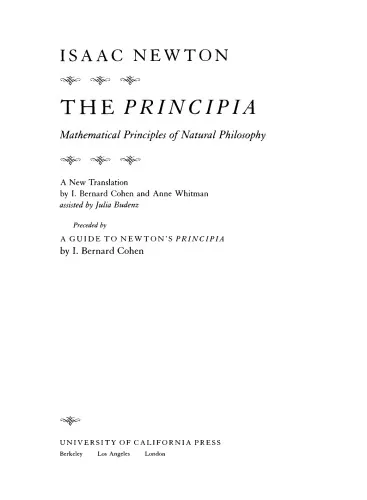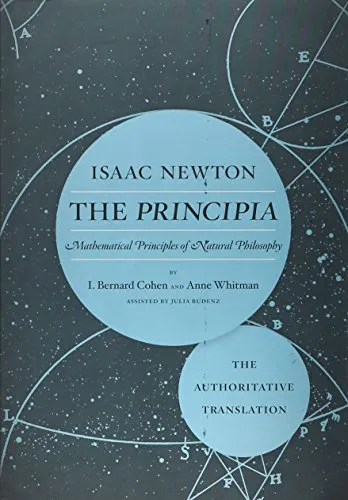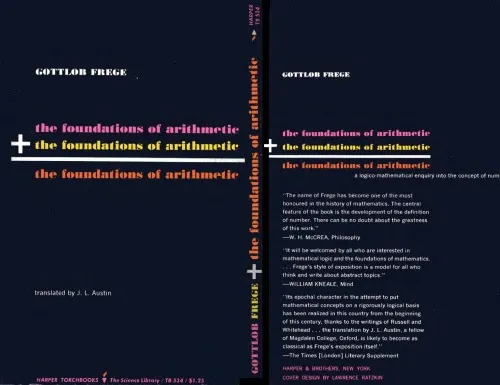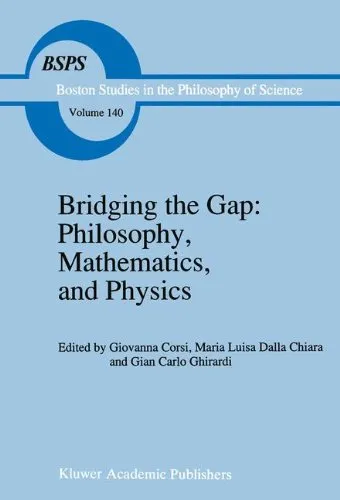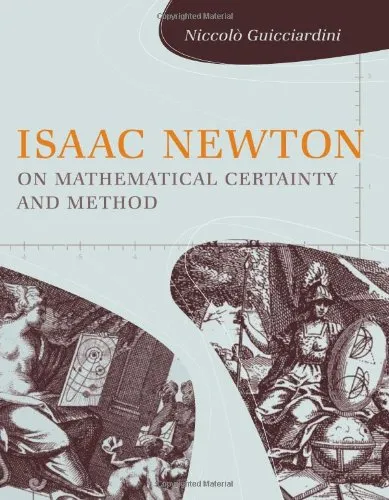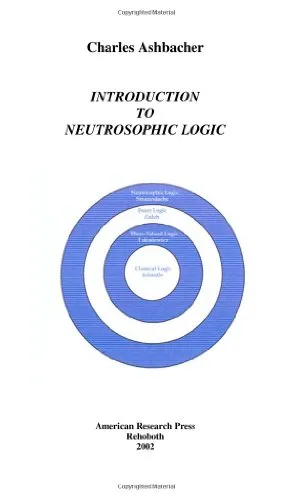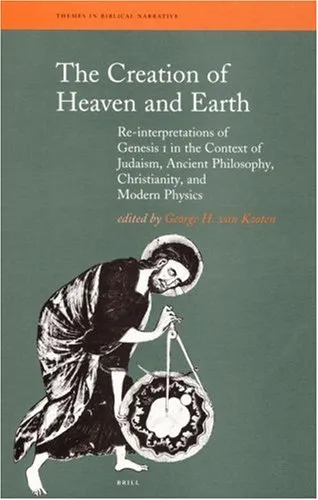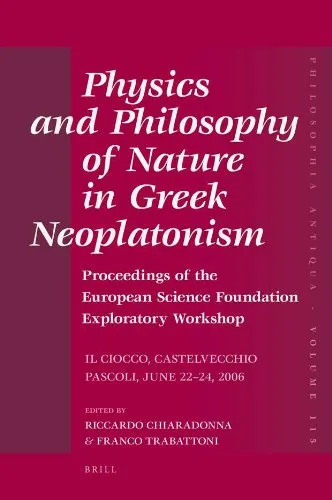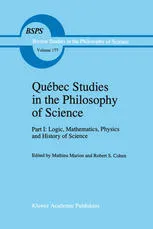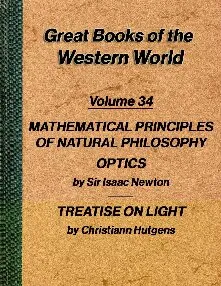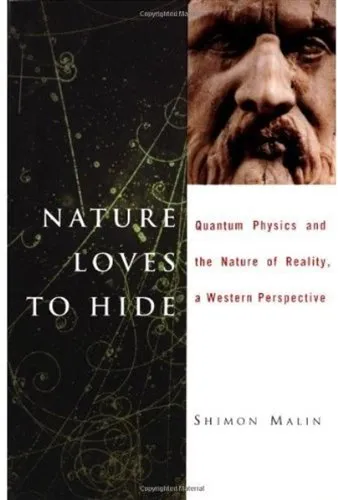The Principia. Preceded by a guide to Newton's Principia by I. Bernard Cohen: mathematical principles of natural philosophy
4.5
بر اساس نظر کاربران

شما میتونید سوالاتتون در باره کتاب رو از هوش مصنوعیش بعد از ورود بپرسید
هر دانلود یا پرسش از هوش مصنوعی 2 امتیاز لازم دارد، برای بدست آوردن امتیاز رایگان، به صفحه ی راهنمای امتیازات سر بزنید و یک سری کار ارزشمند انجام بدینکتاب های مرتبط:
معرفی کتاب "The Principia. Preceded by a guide to Newton's Principia by I. Bernard Cohen: mathematical principles of natural philosophy"
اثر اسحاق نیوتن، "اصول ریاضی فلسفه طبیعی"، یکی از مهمترین آثار علمی در تاریخ علم است. ایروم برنارد کوهن با افزودن یک راهنما به این کتاب، فرصتی را به مخاطبان امروزی میدهد تا عمیقتر به فهم آثار نیوتن دست یابند.
خلاصه دقیق کتاب
کتاب "The Principia" به سه بخش اصلی تقسیم شده است. در بخش اول، نیوتن به معرفی قوانین حرکت میپردازد که شامل معروفترین قانونهای او نظیر قوانین سهگانه نیوتن میشود. بخش دوم به حرکتهای سیارها و اجرام آسمانی میپردازد و تأثیرات گرانش بر آنها را بررسی میکند. بخش سوم، که با نام "سیستم جهان" شناخته میشود، موضوعاتی نظیر گرانش و حرکت ماه و زمین و سیارهای دیگر را پوشش میدهد.
نکات کلیدی
- ارائه قوانین بنیادین حرکت که همچنان امروز مورد استفاده قرار میگیرند.
- توضیح دقیق مفاهیم گرانش و نیروی جاذبه.
- معرفی سیستمهای ریاضی برای مدلسازی حرکتهای سیارهای.
- ارتباط علم مکانیک با اصول فلسفه طبیعی.
جملات مشهور از کتاب
"به هر عملی همواره یک عکس العمل برابر و خلاف آن وجود دارد."
"سیستم جهان، توسط نیروی جاذبه و حرکت همیشه در حال تکرار ساخته شده است."
چرا این کتاب اهمیت دارد
کتاب "The Principia" نه تنها یکی از آثار برجسته علمی در زمان خود به شمار میرود، بلکه به عنوان شروع کننده انقلاب علمی نیز شناخته میشود. این کتاب مفهوم جدیدی از چگونگی کارکرد جهان را در اختیار دانشمندان و فلاسفه قرار داد. با افزودن راهنمایی جامع از سوی ایروم برنارد کوهن، این اثر قادر است به خوانندگان قرن بیست و یکم کمک کند تا به طور عمیقتر به فهم تئوریهای نیوتن بپردازند و اهمیت تاریخی آنها را درک کنند.
توانایی نیوتن در ترکیب ریاضیات دقیق با مشاهدههای علمی او نه تنها اساس دانش مکانیک، بلکه بخش مهمی از ریاضیات و فیزیک مدرن شد.
Introduction to "The Principia. Preceded by a Guide to Newton's Principia by I. Bernard Cohen: Mathematical Principles of Natural Philosophy"
Isaac Newton's "The Principia" is not just a cornerstone of scientific literature but a monumental work that laid the foundation for classical mechanics. It is a compendium of mathematical ingenuity combined with deep insights into the natural world. This edition, preceded by a guide by I. Bernard Cohen, offers a comprehensive view into Newton's genius and the groundbreaking revelations that followed. The book serves as both an entry point for novices and a detailed study for scholars of Newton's profound contributions.
Summary of the Book
The book "The Principia" essentially captures Isaac Newton's scientific vision and his envisioning of the universe governed by natural laws. Newton succeeds in synthesizing the principles of motion and universal gravitation, redefining humanity’s understanding of the natural world. In this edition, the introductory guide by I. Bernard Cohen meticulously sets the stage for understanding Newton's work by breaking down his methods, interpretations, and the historical context within which Newton conceived his theories.
The book is divided into three books. Book I discusses the fundamentals of motion and dynamics, exploring concepts like the laws of motion and centripetal forces. Book II extends these ideas into fluid dynamics and the motion of bodies through resistive mediums, positing early ideas that would later influence hydrodynamics and thermodynamics. Book III synthesizes these results and applies them to celestial bodies, thus forming the basis for what would become known as celestial mechanics. It is here that Newton articulated his law of universal gravitation, revolutionizing astronomy.
Key Takeaways
- Newton's three laws of motion form the core framework for understanding classical mechanics.
- The book describes gravitational attraction between bodies, explaining both terrestrial and celestial phenomena.
- Newton employs a mathematical approach to physics, uniting geometry with physical laws.
- The incorporation of calculus, even though not overtly evident, underpins much of Newton’s mathematical deductions.
Famous Quotes from the Book
Newton's prose is as remarkable as his mathematics, imbued with philosophical insights. Some of the most famous quotes from "The Principia" include:
"I can calculate the motion of heavenly bodies, but not the madness of people."
"To every action, there is always opposed an equal reaction."
Why This Book Matters
Newton's "The Principia" stands as a beacon of scientific thought, laying the groundwork for much of modern science and engineering. It linkages with the Enlightenment era and represents a shift from qualitative natural philosophy to quantitative science. Newton’s ability to describe physical phenomena mathematically transformed science, impacting generations of scientists including the likes of Albert Einstein.
The inclusion of I. Bernard Cohen's guide adds modern insights and analytical depth, making this edition invaluable for researchers and enthusiasts who seek to understand the intricacies of Newton's contributions and how they continue to influence technology and scientific thought today.
دانلود رایگان مستقیم
شما میتونید سوالاتتون در باره کتاب رو از هوش مصنوعیش بعد از ورود بپرسید
دسترسی به کتابها از طریق پلتفرمهای قانونی و کتابخانههای عمومی نه تنها از حقوق نویسندگان و ناشران حمایت میکند، بلکه به پایداری فرهنگ کتابخوانی نیز کمک میرساند. پیش از دانلود، لحظهای به بررسی این گزینهها فکر کنید.
این کتاب رو در پلتفرم های دیگه ببینید
WorldCat به شما کمک میکنه تا کتاب ها رو در کتابخانه های سراسر دنیا پیدا کنید
امتیازها، نظرات تخصصی و صحبت ها درباره کتاب را در Goodreads ببینید
کتابهای کمیاب یا دست دوم را در AbeBooks پیدا کنید و بخرید
1308
بازدید4.5
امتیاز0
نظر98%
رضایتنظرات:
4.5
بر اساس 0 نظر کاربران
Questions & Answers
Ask questions about this book or help others by answering
No questions yet. Be the first to ask!
